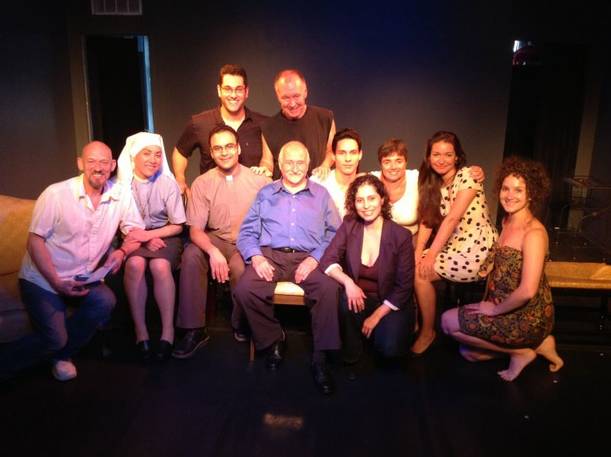


Jst a few days after the end of In Scena, Italian Theater Festival NY, i-Italy had a chance to chat with Nicola Iervasi, Artistic Director of Mare Nostrum Elements (MNE), an organization dedicated to the expression of human emotion through dance, theater, and movement that carries out its work through a performance group, training outlet, and production company. Mare Nostrum was co-organizer of the first Italian Theater festival in the five boroughs of New York, along with Kairos Italy Theater of Laura Caparrotti, and KIT Italia. But that is not all. MNE, was in charge of the festival's tribute to Italian playwright Mario Fratti, which consisted of the representation of three short once act plays: Dina and Alba, Missionaries (starring Nicola himself), and Actors.
Born and raised in Calabria, Nicola always enjoyed alternating his dancing career with other artistic expressions.
Tell me about Mare Nostrum Elements, how did it all start?
Mare Nostrum Elements was founded in 2001 by myself, Italian performer Nicola Iervasi, and American actor/director Kevin Albert. Since the beginning, Nicola and Kevin were committed to providing a nurturing and non-competitive environment for performers to explore different cultures and disciplines, producing both experimental and classic stagecraft. Ours is an organization dedicated to the expression of human emotion through dance, theater, and movement that carries out its work through a performance group, training outlet, and production company. MNE explores the points of intersection among artistic disciplines and shares the results through performances, workshops, and outreach programs throughout the States and Italy.
Mare Nostrum (Our Sea), was the Latin name for the Mediterranean Sea during the Roman Empire, and signifies a common element that connects people of many different nationalities and cultures.
Latin was the official language of the Old World, just like English is today, that is why we picked a phrase in Latin. And last but not least, we added the word Elements to highlight the importance of the individuality of the members of the group and of the different styles they represent.
Do you identify yourself as an Italian or an international company?
Well, the simple fact that we bring together different schools of thought, expression styles and techniques, artists from all corners of the world and that we encourage the use of different languages definitely makes us an international company. I never really gave it too much thought up to now, and it definitely has a certain effect on me to say it out loud. What I can say is that the heart (in addition to myself) is absolutely Italian. Our preference and love for experimental theater, a theater of high emotional value that does not break away from the past define our identity.
How did you decide to participate in the festival with a tribute to Fratti?
When Laura Caparrotti suggested we co-presented the festival with her company (KIT) we started thinking of a possible motif or common thread. Once we decided we wanted to pay homage to Italian theater in America, we instinctively thought of Mario Fratti. Nobody better than him incorporates this characteristic... the fact in itself that during his long and prolific career he has written, and he still writes, in both Italian and English and that he writes about topics that are dear to American culture revisited with a strong dose of Italian humor is proof of that.
How did you pick the three one acts to perform?
We opted for three short plays because we wanted to show the wide range of topics that Mario Fratti addresses in his writing. We didn't want to simply pay homage to him, we wanted to give a nice taste of his art. We wanted to give the audience a night of theater that was simply unique, that touched several different issues, that highlighted Mario's artistic streak and that is, at the same time, both entertaining and fast paced. Dina and Alba, Missionaries and Actors are very different from each other, but what they all have in common is a special twist and an unexpected ending. Overall the show lasts a bit longer than an hour, the public is incredibly engaged, curious and left wanting for more.
How is working on a playwright's work when he is easily reachable? Do you involve him/her in the production process?
I believe this is the first time we work on the material of a playwright that is so easily accessible. Mario Mario Fratti has been more than helpful and incredibly patient from the very first step, but we did not involve him in the production process. We wanted to surprise him with the final product. He was familiar with our work and has seen shows written by others that we have produced in the past. We knew he was going to be satisfied. It was emotional for all of us to see him take in with pride and joy the first performance. He praised the actors for their interpretations and he loved Kevin Albert's direction choices and scenes. In the end he came to see three out of six performances, so my guess is that he enjoyed the show!
And indeed Mario Fratti did. When asked about his opinion he replied. “I'm not a man of many words, but I can say the audience loved it, they were engaged from the beginning to the end, they were surprised and I am sure they did not expect that from me. Ottimo lavoro!”
The future of Mare Nostrum Elements includes a dance production for the fall, Last Chance Lost, a new theater project to be directed by Kevin Albert, the recording of a soundtrack by the title Mediterranean Voices, and, of course, the second edition of In Scena!
Source URL: http://test.iitaly.org/magazine/focus/art-culture/article/italian-theater-paying-homage-mario-fratti
Links
[1] http://test.iitaly.org/files/frattimario1373085305jpg